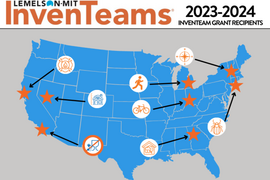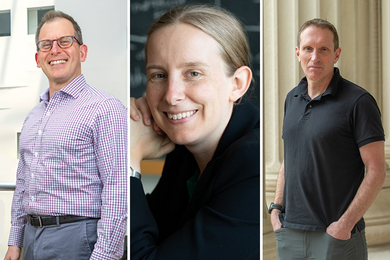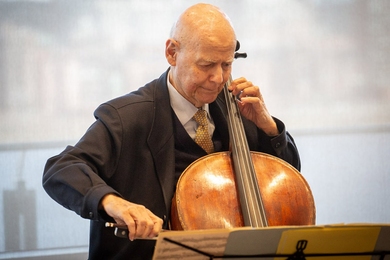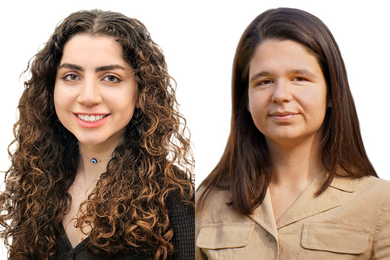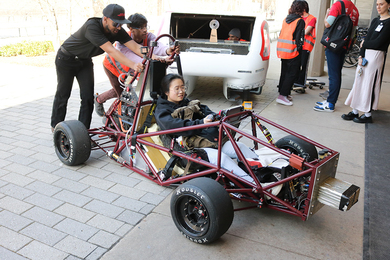On Nov. 29, a team of young adults stood in front of a crowd at The Link coworking space in Kendall Square, Cambridge, Massachusetts, and presented their idea for a smart, watch-like device that monitors a user’s vitals for signs of anger and prompts them with guided breathing exercises. The device would also connect via Bluetooth to a virtual reality headset that could lead the user through conflict resolution scenarios.
Such high-tech presentations are common in Kendall Square, but the presenters weren’t a team of PhD students — they were local Cambridge youth working as part of the Lemelson-MIT Program’s Leaders Inventing the Future Together (LIFT) initiative.
In collaboration with My Brother’s Keeper (MBK) Cambridge, the LIFT program offered 18- to 24-year-old local residents an intensive, six-week course covering invention, technology, and entrepreneurship. The program worked in conjunction with MBK’s curriculum on mental health coaching and challenged participants to create solutions for problems they see in their community.
“We’re trying to bring inclusive invention and innovation into our community, especially for people who are traditionally kept out of these kinds of spaces,” Lemelson-MIT Project Facilitator Michelle Sullivan said at the final pitch event. “They also just have really good ideas, and the Cambridge community is our backyard. While we’re working nationwide, we want to be a part of the local community.”
For MBK Cambridge, a nonprofit that supports local youth and parents, the partnership offered an opportunity to tap into MIT’s innovation resources and ecosystem.
“One of MBK’s goals is to provide a springboard to the 21st-century economy,” MBK Cambridge Co-president Ty Bellitti says. “So many of our young people in Cambridge are extremely dynamic, but we’re not 100 percent sold that a traditional academic setting brings out their genius. Having Kendall Square just a stone’s throw away from where these young people are growing up, it’s only right that they have access to not only buildings, but the ideas being exchanged within these buildings.”
Many of the participants said that exposure has changed the way they think about their careers.
“I wasn’t sure what to expect, but working with MIT has been amazing,” Cambridge resident Khalib Dottin said. “I’ve been hearing about this school my entire life. Being able to work with them has been a pleasure.”
A program with a purpose
The collaboration began when Tony Clark, the other co-president of MBK, worked with Lemelson-MIT in the spring as part of a program with local high school students.
“Tony would come tell me about it every week,” Bellitti recalls. “He was saying, ‘What these kids are doing is incredible. It’s really opening their mind to the possibilities of invention.’”
MBK was already planning a mental health coaching program this fall, so it teamed up with Lemelson-MIT to incorporate a curriculum on inventing technologies to help with mental health.
On Tuesdays and Thursdays from 6 to 9 p.m., Lemelson-MIT would work with the students, equipping them with skills like identifying a problem, prototyping, and getting feedback, and on Wednesdays MBK would conduct its mental health coaching program.
“Learning about mental health can be challenging because you’re learning about your own mental health and where you stand with anxiety and depression, and often times things pop up for you because you see it in yourself or you see it in friends and family,” Bellitti says. “But it’s also been great watching young people run toward the idea that mental health discussions are important. We’re normalizing those conversations.”
Participants were paid hourly for their participation, which required them to commit several hours toward the work a week. But Clark says it wasn’t about the money. He knows because the week leading up to presentations, participants were calling him late at night to get access to their center to work on their project on the side.
“We couldn’t kick them out,” Clark jokes.
Participants formed teams and Clark says there was a competitive atmosphere. But he was also heartened to see teams come together to help each other through different technical and business problems.
“It was a great opportunity,” said participant Abdul Dirir. “I’ve never had an experience like this, where I’m creating new ideas for society. It was definitely a challenging process, but my team caught on quickly and each day we just got better and progressed.”
Clark and Bellitti have come to see entrepreneurship as a promising career path for their youth.
“There are over 70 companies on the NASDAQ in Cambridge, and they all started with an idea,” Clark says. “When you talk to our young people, you realize their dreams might not be found in a typical job description, so how do they create that pathway for themselves? The recent Cambridge election was all about rent, but these young folks want to own, and part of being an entrepreneur is owning your time. That’s critically important to these young people.”
Beyond the classroom
Toward the end of the program, Bellitti brought participants to Microsoft as part of an effort to expose participants to careers in technology. As they were waiting in the lobby, MBK’s young people were discussing Raspberry Pi circuit boards and Micro:bits. A few were disagreeing over what tech they were going to use to build their drones.
“No matter what we expose our young folks to, they walk in speaking one language and they walk out speaking another,” Bellitti says. “They’re talking about getting access to makerspaces and The Hive [co-working space] and 3D printers to continue on with their inventions. It’s been a beautiful thing to witness.”
Many participants said they would continue working on their projects after the program. Dirir, for instance, came into the program thinking he wanted to be a financial advisor. The program made him think about becoming an engineer and building things to solve problems instead.
“Especially being a person of color, this program made my potential more clear,” Dirir said. “It showed me some missing pieces, like the importance of networking.”
The program focused less on making sure participants become startup founders and more on equipping them with broader skills they can use no matter their career paths. It also aimed to show them that they have what it takes to lead businesses like the ones whose skyscrapers dot the skyline around Kendall Square.
“A lot of these youth want to pursue careers in technology, and this experience has solidified their decision to enter the field,” Bellitti says. “That makes us proud because we want our young people to be in the C suites and to earn a living for themselves that allows them to live a life of their dreams. We’ve got the examples right here in their own city. They don’t have to go far to find it.”

